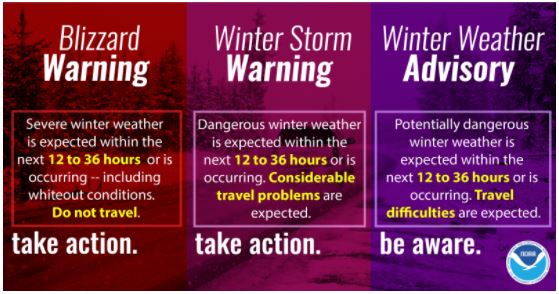Winter storms can be dangerous and accompanied by low temperatures, strong winds, sleet, and freezing rain. Severe weather can knock out heat, power, and communication for several days. Winter storms create a higher risk of car accidents, hypothermia, frostbite, carbon monoxide poisoning, and heart attacks from overexertion. Be sure to stay updated on local weather by listening to the radio, tuning to a local weather channel, or following social media.

Stay informed – Check for emergency weather notices on local sites and monitor the weather.
Be Prepared
Preparing for winter weather is an excellent time to install and test smoke alarms and carbon monoxide detectors. Carbon monoxide is an odorless, colorless gas that can be deadly
- Never let the car idle in the garage
- Don’t use a gas range or oven to dry clothes or heat your home
- Make sure chimneys and flues are cleaned and in good condition
- Symptoms of carbon monoxide poison:
- Fatigue
- Dizziness
- Headache
- Irritability
Plan Ahead
In the event of severe Winter weather, it’s helpful to have a plan in place to ensure you and your household are safe. If severe weather is anticipated:
- Ensure weather-stripping and insulation are in place to keep out the cold
- Have extra supplies on hand batteries, medication, food that doesn’t need to be cooked, and food for pets
- Make sure your gas tank is at least half full
- Stock baby items
- Cat litter or sand for icy sidewalks
- Fully charged cell phone batteries
- Water
Staying Safe During Winter Weather
Stay indoors and off the roads if possible. If you are driving and become stuck, stay in your car and call for help.
- If using wood stoves or space heaters be sure to do so safely
- Never place heater near or on top of furniture
- Make sure cords are not damaged
- Never cover your space heater with anything
- Use generators outside 20 feet away from your home, doors, and windows
After Winter Weather
Stay indoors if possible to protect yourself from frostbite and hypothermia. Frostbite causes loss of feeling and color around the face, fingers, and toes. If you have to go outside, wear several layers of warm loose-fitting clothing. Signs of frostbite may include
- Numbness
- White or grayish-yellow skin
- Firm or waxy skin
If you experience frostbite, get into a warm room and soak in warm water. Use body heat to warm up. Do not massage or use a heating pad.
Hypothermia is when the body temperature gets below 95 degrees. Some signs of Hypothermia may include
- Shivering
- Exhaustion
- Confusion
- Fumbling hands
- Memory loss
- Slurred speech or drowsiness
If you should experience hypothermia get into a warm room. Warm the center of your body first, chest, neck, head, and groin. Keep dry and wrapped up in warm blankets.